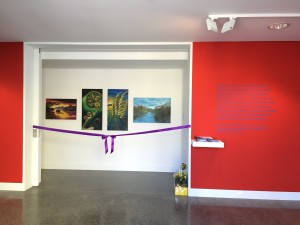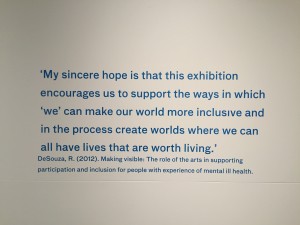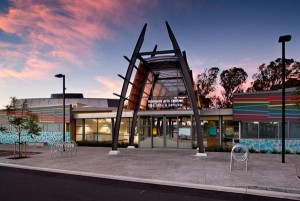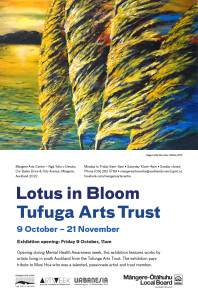I was honored to be invited to write a catalogue piece for an exhibition which opened during Mental Health Awareness Week 2015 at Mangere Arts Centre – Nga tohu o Uenuku and which closes on 22nd November. Lotus in Bloom is an exhibition of works by artist members of the Tufunga Arts Trust, whose visual arts programme enables artists living with mental illness to develop their art practice and the Trust supports artists by providing opportunities to exhibit their work.
Art makes visible experiences, hopes, ideas; it is a reflective space and socially it brings something new into the world—it contributes to knowledge and understanding. In so doing it is intrinsically political (O’Neill, 2008)
“Lotus in Bloom” an exhibition at Mangere Arts Centre of 80 works by thirty artists with experience of mental ill health makes visible their experiences and hopes, while simultaneously bringing new knowledge and understanding to the broader community. Tufuga – Creative hands, mind and spirit is a charitable trust that supports people with experience of mental ill health to lead their own recovery. Set up in May 2004 in Counties Manukau, South Auckland it aims to “enable access to art and creative experiences in an environment that nurtures cultural well-being”. In using arts as a medium, people with experience of mental ill health are supported to engage in creative expression and meaningful activity, countering experiences of social exclusion. Lasting impact was the second exhibition of their artwork.
The notion of recovery permeates contemporary mental health services inspiring a transition from symptom amelioration to supporting people experiencing mental ill health to ‘live well’ on their own terms. Recovery approaches and mental health promotion challenge the confining language of psychiatric symptomatology and endemic “therapeutic pessimism” in biomedical models, which contribute to stigma and discrimination and compound social exclusion. Mental health promotion refers to:
the process of enhancing the capacity of individuals and communities to take control over their lives and improve their mental health. Mental health promotion uses strategies that foster supportive environments while showing respect for culture, equity, social justice and personal dignity. (Joubert and Raeburn, p.19).
Most powerfully, recovery approaches promote a philosophical shift from a medical model of mental illness to a social model. The possibility of recovery despite illness is invoked through offering hope and enabling self-determination, by resourcing people with experience of mental ill health to pursue their own goals. These philosophical changes in mental health care provision have instigated a shift in power relations, challenging mental health professionals, policy makers and service providers to consider the adequacy of expert knowledge and in doing so dismantling a hierarchy where expert driven practices are valued above client and family knowledge. The client’s lived experience of illness and their needs have become more central to the mental health support offered. However, these changes go beyond inclusion in the therapeutic encounter, requiring that communities support participation and inclusion. The Like Minds Like Mine social marketing programme in New Zealand is one example of a stigma countering initiative that has helped to both educate and build public support.

The arts hold promise for meeting inclusion and recovery agendas. Participation in community arts can further public health imperatives for reducing social and health inequalities and facilitating social inclusion by enhancing social capital. Having one’s experiences refracted through an asset and strengths based lens rather than as a dependent consumer of services, can help an artist with an experience of mental ill health to develop a more positive self-image. Being recognised as having an ability, whether as an artist or teacher can counter pathology and illness laden representations. The safety and mutual support in arts environments for the recovery journeys of participants can extend beyond feeling good to opening up opportunities for artists to generate income and work.
My sincere hope is that this exciting exhibition incites the broader community to support the aspirations of artists who experience mental ill health; to examine the ways in which “we” can make our world less disabling and in the process create worlds where we can all have lives that are worth living.

References
Joubert, N. & Raeburn, J. (1998). Mental health promotion: People, power and passion. International Journal of Mental Health Promotion, 1 (1), 15–22.
O’Neill, Maggie (2008). Transnational Refugees: The Transformative Role of
Art? [53 paragraphs]. Forum Qualitative Sozialforschung / Forum: Qualitative
Social Research, 9(2), Art. 59, http://nbn- resolving.de/urn:nbn:de:0114-fqs0802590.
Stickley, T. (2008). Promoting mental health through an inner city community arts programme: A narrative inquiry. PhD diss, University of Nottingham, United Kingdom.

